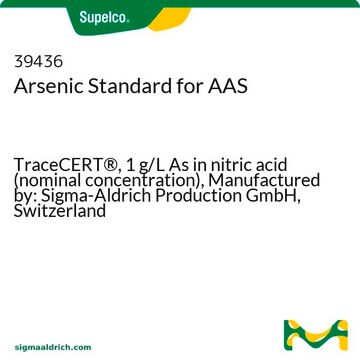43820
Dithizone
ACS reagent, for spectrophotometric det. of Cd, Cu, Hg, Pb, Zn, ≥98.0% (TLC)
Synonym(s):
Diphenylthiocarbazone
About This Item
Recommended Products
grade
ACS reagent
Quality Level
Assay
≥98.0% (TLC)
form
powder
quality
for spectrophotometric det. of Cd, Cu, Hg, Pb, Zn
technique(s)
UV/Vis spectroscopy: suitable
mp
168 °C (dec.) (lit.)
functional group
amine
SMILES string
S=C(NNc1ccccc1)\N=N\c2ccccc2
InChI
1S/C13H12N4S/c18-13(16-14-11-7-3-1-4-8-11)17-15-12-9-5-2-6-10-12/h1-10,14H,(H,16,18)/b17-15+
InChI key
UOFGSWVZMUXXIY-BMRADRMJSA-N
Looking for similar products? Visit Product Comparison Guide
General description
Application
- Dithizone modified silver electrode for the determination of metal ions in aqueous solution: This study discusses a dithizone-modified electrode used for the electrochemical determination of various metal ions, highlighting its applications in environmental monitoring and industrial process control (Othman et al., 2016). Source.
- Eco-friendly immobilization of dithizone on coal bottom ash for the adsorption of lead (II) ion from water: This study explores the use of dithizone-immobilized coal ash for the efficient removal of lead from water, demonstrating a cost-effective method for treating contaminated water (Huda et al., 2021). Source.
- Colorimetric Sensing of Pb2+ Ion by Using Ag Nanoparticles in the Presence of Dithizone: The article details the development of a colorimetric sensor for lead ions, which uses silver nanoparticles and dithizone, providing a rapid and sensitive method to detect heavy metal contamination in environments (Roto et al., 2019). Source.
- Dithizone-etched CdTe nanoparticles-based fluorescence sensor for the off–on detection of cadmium ion in aqueous media: This research presents a fluorescent sensor based on dithizone-etched CdTe nanoparticles for detecting cadmium ions, offering applications in environmental monitoring and safety assessments (Li et al., 2017). Source.
Other Notes
Signal Word
Warning
Hazard Statements
Precautionary Statements
Hazard Classifications
Eye Irrit. 2 - Skin Irrit. 2
Storage Class Code
11 - Combustible Solids
WGK
WGK 3
Flash Point(F)
Not applicable
Flash Point(C)
Not applicable
Personal Protective Equipment
Choose from one of the most recent versions:
Already Own This Product?
Find documentation for the products that you have recently purchased in the Document Library.
Customers Also Viewed
Our team of scientists has experience in all areas of research including Life Science, Material Science, Chemical Synthesis, Chromatography, Analytical and many others.
Contact Technical Service












